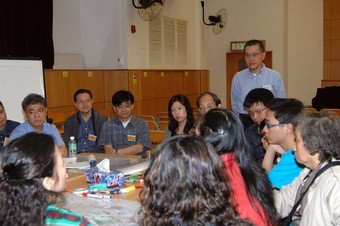Sham Shui Po community workshop on urban regeneration
Local leaders and residents of the Sham Shui Po community
gathered at a workshop today (Saturday) putting their heads
together to explore possible ways forward for urban regeneration of
the district as a blueprint for all concerned.
Speaking at the opening of the workshop, the Chairman of the Urban
Renewal Authority (URA), Mr Edward Cheng said: "this workshop was
jointly organized by the Sham Shui Po District Advisory Committee
(DAC) of the URA and the Sham Shui Po District Council, which is
part of URA's ongoing efforts to ascertain public aspirations and
views on the future blueprint of the district."
"As one of the key players for the district's regeneration, URA is
keen to see how it can contribute to providing some relief to
issues relating to poverty and an aging population, Mr Cheng
added.
The Chairperson of the URA Sham Shui Po DAC, Professor Cecilia
Chan, pointed out that: "Sham Shui Po is a poor district with the
lowest median household income in Hong Kong. It is also one
of the nine target areas in our urban renewal programme. In recent
years, following the implementation of 12 urban redevelopment
projects at a total development cost of over $8.4 billion in the
district, five of which are in association with the Hong Kong
Housing Society, some 2,500 families have been able to improve
their living environment. Moreover, URA's rehabilitation
initiatives have also benefited some 800 families in the district.
Together with our proposed revitalisation efforts at Tung Chau
Street, Yen Chow Street and Nam Cheong Street, URA projects would
gradually bring a new face to the entire district.
"In the last couple of years, a number of local organizations have
expressed an immense interest in the future direction of urban
regeneration for the district and have done a lot of research work
in this regard."
"Through this workshop, the URA hopes not only to have a firm
grasp of the vision and aspirations of the local community but also
to establish a much closer mutual understanding between all
interested parties," Professor Chan added.
About 130 community leaders, District Council members, URA Sham
Shui Po DAC members, Area Committee members, representatives from
government departments, owners' corporations, professional bodies,
non-government organizations and residents groups took part in the
workshop which was facilitated by a research team of the Department
of Social Work and Social Administration of the University of Hong
Kong led by Dr Law Chi-kwong.
Apart from Mr Edward Cheng and Prof Chan, the Chairman of the Sham
Shui Po District Council, Mr Tam Kwok-kiu also addressed the
workshop. Other guest speakers included Dr Wong Yu Cheung of
Department of Social Work & Social Administration of the
University of Hong Kong; Dr. Ting Sun Pao, a veteran heritage
conservationist; Mr. Pang Chuck Hang and Mr Albert Kwong of Hong
Kong Housing Society; Mr Eddie Lui, Planning Director of the Jockey
Club Creative Arts Centre; Dr Wong Hung of Department of Social
Work of the Chinese University of Hong Kong and Mr Kenneth Li, URA
Senior Manager (Planning).
(END)

